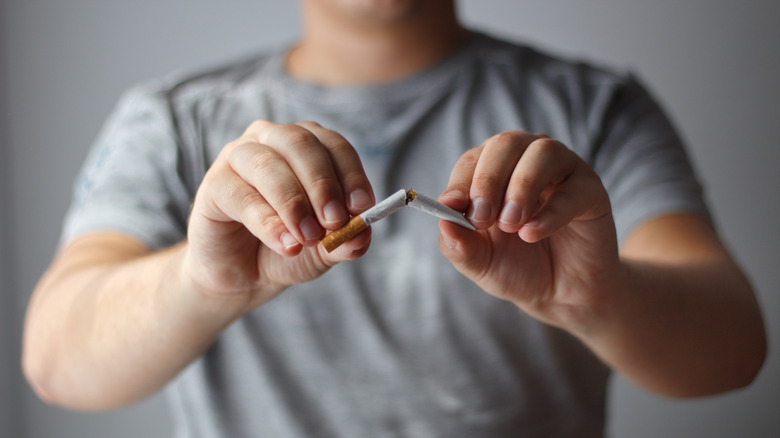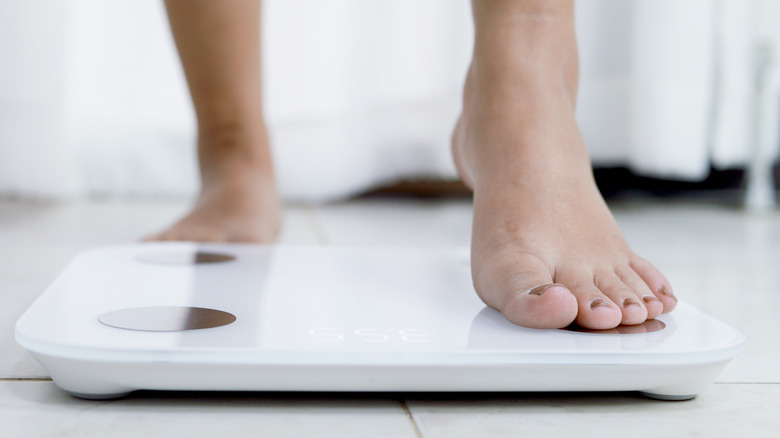Things Your Doctor Wants You To Stop Doing
Your doctor may be full of recommendations. These likely include eating a well-rounded diet, exercising regularly, and getting enough sleep. During your appointments, your doctor surely wants you to put away your phone, get to the point of your visit in an efficient manner, and share the full story behind your symptoms. Doctors also want you to know that they are not making you wait on purpose; they often need details to make a diagnosis; and they've heard it all before –– so don't hold anything back on their account (per Parade).
Along with advocating for healthy behaviors, there are things your doctor wants you to stop doing in order to improve your overall well-being. In a perfect world, your doctor would say these things to you directly. In reality, your doctor may hold back due to time constraints, fear of lawsuits, or a desire not to hurt your feelings (via The Healthy).
Stop being sedentary
Your doctor wants you to get off your behind and exercise as much as possible. This is because physical activity offers a wide range of health benefits. It can boost your brain, help with weight management, strengthen bones and muscles, and improve your ability to perform daily activities (via CDC). Exercising regularly can also reduce your risk of anxiety and depression, improve sleep, and even help prevent serious health conditions.
When you think of "exercise," your mind may flicker immediately to cardiovascular activities like walking, biking, or swimming. While these are definitely important, the Mayo Clinic suggests that a well-rounded exercise program should include several elements, like "aerobic fitness, strength training, core exercises, balance training, and flexibility and stretching." If this seems like a lot, rest assured that you don't need to fit in all of these elements every time you work out.
Along with exercising regularly, it is important to avoid prolonged sitting or standing during the day. According to WebMD, sitting too much can increase your risk for heart disease, diabetes, dementia, cancer, deep vein thrombosis (DVT), weight gain, back pain, mental health issues, and early death. And unfortunately, a 2015 study in Rehabilitation Nursing Journal suggests that standing for long periods of time isn't much better. This position can lead to pain or discomfort in the lower back and legs, fatigue, and cardiovascular issues. If you have a job that requires a lot of standing or sitting, try to take frequent breaks when you can to move around.
Stop smoking or vaping
Where to start? The dangers of smoking and vaping are well-documented and far-reaching. Individuals who smoke are at increased risk for developing heart disease, cancer, diabetes, blood clots, and many other dangerous health conditions (via Healthline). Although e-cigarettes and other vaping devices may (or may not) be less harmful than traditional cigarettes, they are full of highly addictive nicotine, may impact brain development, and can lead to lung injury, according to the Office of Health and Human Services. Naturally, your doctor wants you to quit.
Dr. Michael Joseph Blaha, physician and director of clinical research at the Ciccarone Center for the Prevention of Cardiovascular Disease, told Johns Hopkins Medicine, "People need to understand that e-cigarettes are potentially dangerous to your health. Emerging data suggests links to chronic lung disease and asthma, and associations between dual use of e-cigarettes and smoking with cardiovascular disease. You're exposing yourself to all kinds of chemicals that we don't yet understand and that are probably not safe."
The American Heart Association suggests five steps to success: Choose a "Quit Day" in the next seven days, choose a method (i.e. cold turkey or gradually cutting back), talk to your doctor about medications that may be beneficial, plan strategies for your post-smoking life, and then (finally!) follow through with your plan to quit. If you need help quitting smoking or vaping, talk to your doctor or call 1-800-QUIT-NOW.
Stop avoiding the scale
Although we can understand the temptation to avoid the scale, your doctor wants you to stop doing this. According to Healthline, recent studies indicate that weighing yourself daily may help you lose weight and maintain weight loss. As you may already be aware, having obesity or overweight can place you at increased risk for diabetes, high blood pressure, heart disease, stroke, sleep apnea, kidney disease, and some types of cancer (via National Institute of Diabetes and Digestive and Kidney Diseases). Being underweight can also be dangerous, potentially involving malnutrition, fatigue, getting sick frequently, impaired growth (for children and teens), and reproductive complications in women (per Medical News Today).
To reduce both physical and emotional health risks, you should aim to maintain a healthy body mass index (BMI). The CDC states, "If your BMI is less than 18.5, it falls within the underweight range. If your BMI is 18.5 to 24.9, it falls within the normal or Healthy Weight range. If your BMI is 25.0 to 29.9, it falls within the overweight range. If your BMI is 30.0 or higher, it falls within the obese range." To determine where your BMI falls, enter your height and weight on this BMI calculator.
Stop following fad diets
No matter the tempting claims of the latest craze, your doctor wants you to stop following fad diets. According to the University of Georgia, fad diets tend to be overly restrictive, can deprive your body of important nutrients, and are not usually sustainable. While most of the trending diets today likely offer pros and cons, most health experts recommend focusing on long-term goals through lifestyle changes as opposed to seeking out rapid weight loss programs. SFGate clearly describes the difference between dieting and lifestyle changes: "A diet consists of temporarily changing your eating habits to promote a certain outcome — commonly weight loss — before returning to your previous eating habits. On the other hand, a lifestyle change consists of adopting healthy overall habits that promote long-term weight control and health." In other words, your doctor probably doesn't want you to "diet" at all.
When it comes to making significant dietary changes, the Cleveland Clinic suggests talking to your doctor first. "What's ideal for someone else may not be the best option for you based on your health history," the article reads. Your doctor can help you identify personalized goals and make recommendations on how best to achieve them. You can also take a look at the 2020-2025 Dietary Guidelines for Americans, which includes eating plenty of vegetables, fruits, and grain products, and limiting fat, sodium, sugar, and alcohol.
Stop consuming so much sugar and sodium
You probably already know that eating too much sugar and sodium can be harmful to your health. But how much is too much? The American Heart Association recommends that men limit their daily consumption of added sugar to 9 teaspoons (36 grams or 150 calories). For women, this number is even lower at 6 teaspoons (25 grams or 100 calories). For comparison, the average amount of daily sugar consumed by American adults is a whopping 77 grams — or 19 teaspoons!
Things don't look much better with sodium. Because sodium is an essential nutrient, you may be concerned that you're not getting enough. This is unlikely to be the case, however, since the body needs only a small amount daily (less than 1⁄4 teaspoon or 500 milligrams) to function properly. The average amount consumed by American adults each day is 3,400 milligrams. The American Heart Association recommends limiting your sodium intake to no more than 2,300 milligrams per day. Ideally, most adults should keep this under 1,500 milligrams.
Keep in mind that processed foods are a major source of added sugar and sodium, along with unhealthy fats. The Harvard T.H. Chan School of Public Health explains that highly processed and ultra-processed foods have been linked with poor health outcomes. If you regularly eat these types of foods, you may be at increased risk for obesity, autoimmune diseases, metabolic syndrome, inflammatory bowel disease, colorectal cancer, anxiety, and depression (per Verywell Fit).
Stop going to bed late
Another thing your doctor wants you to stop doing is staying up late. Getting enough sleep is an essential component for your overall physical, cognitive, and emotional health. Most adults require seven or more hours of quality sleep per night, according to the U.S. Department of Health and Human Services. Kids and teens need even more. When you don't get enough sleep, you may be at increased risk for high blood pressure, heart disease, heart attack, stroke, diabetes, and other serious health conditions. You are also more likely to have poor judgment, accidents, a lower libido, depression, and weight gain than when you've had a good night's rest (per WebMD).
If you're having trouble sleeping, the Mayo Clinic offers six tips to better sleep: Maintain a strict sleep schedule, be mindful of what you eat and drink before bedtime (avoid large meals, caffeine, alcohol, and nicotine), establish a comfortable sleeping environment, limit daytime napping, be physically active during the day, and do what you can to resolve any concerns or lingering anxiety before heading to bed. Additionally, be sure to talk to your doctor about your sleep struggles.
Stop dismissing your mental health
You may not realize this, but your doctor cares just as much about your mental health as your physical health. Even if you feel embarrassed or uncomfortable, we encourage you to discuss mental health challenges with your doctor. When mental health problems are left untreated, they can become even worse and more difficult to treat later on, according to Psychology Today. This can lead to physical symptoms like headaches, muscle aches, and gastrointestinal issues, along with placing you at increased risk for obesity, heart attack, stroke, and premature death.
Symptoms of anxiety and depression, which often go hand in hand, include fatigue, difficulty concentrating, irritability, and sleep disturbances (per Everyday Health). You may also experience irrational fears or feelings of sadness or worthlessness. You may also lose interest in your usual activities or experience panic attacks. Fortunately, help is available. Your doctor can work with you to identify mental health resources such as therapy, medications, and relaxation techniques. Many patients also benefit from getting regular exercise.
If you or someone you know is struggling with mental health, please contact the Crisis Text Line by texting HOME to 741741, call the National Alliance on Mental Illness helpline at 1-800-950-NAMI (6264), or visit the National Institute of Mental Health website.
Stop drinking excessive amounts of alcohol or caffeine
Many people look forward to their cup of joe in the morning or a glass of wine in the evening. While these daily habits are probably fine for most individuals, your doctor undoubtedly wants you to stop consuming unsafe amounts of caffeine and alcohol.
The Mayo Clinic asserts, "Up to 400 milligrams (mg) of caffeine a day appears to be safe for most healthy adults. That's roughly the amount of caffeine in four cups of brewed coffee, 10 cans of cola or two 'energy shot' drinks." If you drink more than four cups of coffee (or the equivalent) per day, you may experience side effects like headaches, insomnia, nervousness, irritability, urinary issues, rapid heartbeat, and muscle tremors. Excessive amounts of caffeine can also interfere with sleep and some medications.
As for alcohol, the CDC recommends drinking no more than two drinks a day for men or one drink a day for women. A standard drink is considered 5 ounces of wine, 8 ounces of beer, or a 1.5 oz shot of spirits (e.g., vodka, rum, or whiskey). When you drink excessive amounts of alcohol, you place yourself at increased risk for a range of chronic diseases, including liver damage and some cancers, along with injuries and violence. If you are pregnant, you may cause irreparable harm to the developing fetus. Instead of drinking alcohol or caffeine, reach for a healthier option like water, mint tea, fat-free milk, or a homemade smoothie (via MedicineNet).
Stop skipping health screenings
If you have avoided the doctor lately, you are certainly not alone. However, skipping health screenings is not advised (Johns Hopkins Medicine). According to the U.S. Department of Health and Human Services, health screenings are so important because they can help identify problems early on, when they are easier to treat. This may be before you've even developed any symptoms or signs that something is wrong. "People are afraid of the unknown and they don't want to find things wrong, but the best way to keep things from going wrong is to see your doctor regularly," internist Mehul Thakkar told Cedars Sinai.
If you're not sure what screenings you are due for, visiting your primary care provider is a good place to start (via Cedars Sinai). Depending on your individual situation, your doctor may perform a physical exam, order medical imaging, or conduct laboratory tests. You can also take a look at the U.S. Department of Health and Human Services' recommendations for health screenings, broken down by sex and age, or use their convenient MyHealthFinder tool.
Stop avoiding vaccines
While getting vaccinated has unfortunately become a subject of political debate, it is actually very simple from a health perspective –– vaccines save lives. Depending on your age, prior vaccination history, health status, and other factors, your doctor may recommend various vaccines, including pneumococcal, tetanus toxoid, reduced diphtheria toxoid and acellular pertussis (Tdap), shingles, human papillomavirus (HPV), and COVID-19 (via Mayo Clinic). There may also be additional vaccines that you can benefit from. The seasonal flu shot, typically administered in the fall, is recommended for almost everyone aged 6 months or older (via Live Science).
If you have concerns about getting vaccinated against COVID-19 or any other disease, talk to your doctor to ensure that you are basing your health decisions on accurate medical information. According to the CDC, COVID-19 vaccines are safe, effective, and can provide effective protection against COVID-19, especially from severe disease and death. They are widely available at no cost and recommended for individuals aged 5 and older.
Stop consulting Dr. Google
Perhaps you have an unexplained rash, fever, and sore throat, so you decide to type these symptoms into your internet browser's search bar. The results lead you down a rabbit hole of information and misinformation. Sound familiar? This is why your doctor wants you to stop searching the internet for medical advice. Seriously. When you self-diagnose or self-treat instead of visiting your doctor, you risk getting it wrong. This can have dangerous implications. One potential outcome involves dismissing symptoms as nothing to worry about, when the reality is that timely treatment was required.
Another potential outcome is inaccurately concluding that something is more serious than it actually is. Increased anxiety as a result of health-related web searches is such a common occurrence that it even has a name –– "cyberchondria" (per Healthline). Michael H. Perskin, an assistant professor of Internal Medicine at the NYU Langone Medical Center, told The Atlantic that one out of every 20 of his patients with extreme fatigue conclude they have lupus after conducting online searches. While he explains that almost all of them are wrong –– only one in 500 patients with extreme fatigue actually have lupus –– he also acknowledges that health-related searches can help patients be better prepared and ask more informed questions. Bottom line? If you decide to ask Dr. Google a question, be sure to follow up with a timely visit to a real-life doctor.
Stop omitting information
Your doctor wants you to stop omitting health information. In a 2018 study by JAMA Network Open, approximately 61% of patients avoided disclosing at least one type of medically relevant information to their providers. Whether you are not reporting all your symptoms, lying about bad habits, or not taking medications as prescribed, your doctor needs to know exactly what is going on in order to provide you with the best possible care.
In a U.S. News & World Report article evaluating why patients lie to their doctors, a number of causes were identified. For one, a patient may not understand the provider's instructions or may disagree with their recommendations. Some patients don't want to disclose unhealthy eating habits, lack of exercise, or that they are not following medication instructions.
If you are omitting relevant health information due to concerns about privacy, keep in mind that your doctor is bound by doctor-patient confidentiality, according to The Healthy. This site also identifies some additional topics that you should never lie to your doctor about, including your surgical history, age, smoking habits, supplements you take, recreational drug use, and whether you've ever had an abortion.
Stop skipping water
Good hydration is key to maintaining good health. In fact, if you don't drink enough fluids, your body won't be able to function properly. Drinking water can help with weight loss, energize muscles, nourish skin, assist kidney function, and prevent constipation. Dr. Steven Guest, a nephrologist with Kaiser Permanente, told WebMD, "Fluid losses occur continuously, from skin evaporation, breathing, urine, and stool, and these losses must be replaced daily for good health." So, how much water should you drink each day? Well, it depends. While a long-time standard has advised consuming eight 8-ounce glasses daily, Harvard Health now recommends 4 to 6 cups for most healthy people. However, individual needs can vary based on factors like activity level or the weather. When you are sweating a lot, you will require more fluids.
Of course, water isn't your only option for hydration. Any beverage (or food) containing water can help you reach your daily hydration goals, though you may wish to limit sugary, caffeinated, or alcoholic drinks for other health reasons. To stay hydrated, Scripps Health suggests a number of helpful tips, like drinking before you feel thirsty and eating plenty of water-rich fruits and vegetables. You should also be on the lookout for signs of dehydration. These can include darkened urine, lack of urination, muscle cramps, bad breath, fatigue, irritability, fever, and chills.
Stop ignoring medical advice
Unfortunately, ignoring medical advice is a potentially harmful behavior that is surprisingly common. A team of researchers studied the challenge of patient adherence in a report published in Therapeutics and Clinical Risk Management. They observed that nonadherence to medical advice can generally threaten health and well-being, along with taking an economic toll. "In some disease conditions, more than 40% of patients sustain significant risks by misunderstanding, forgetting, or ignoring healthcare advice," wrote the researchers. According to WebMD, some patients can experience outright denial when it comes to facing their health realities.
Instead of ignoring medical advice, consider why you are tempted to do so. Then, discuss your challenges with your doctor. If you don't understand something, ask them to clarify. If you disagree with a recommendation, let your doctor know. If you can't afford medication or treatment, talk to your provider about options. Your doctor is probably already aware that there are often real-world constraints preventing patients from following medical advice.















